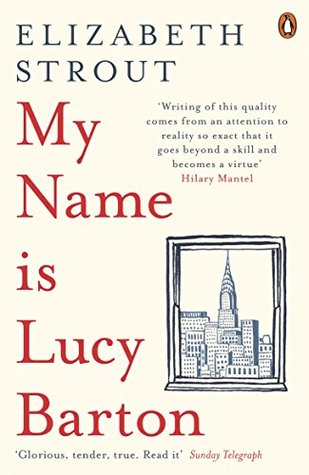Amazon prompted me to read My name is Lucy Barton by Elizabeth Strout, and Amazon got it right. Slowly but surely Amazon–or is it Google?–knows more about me than anybody else. Indeed, with the clarity of their machine minds and their inability to forget, they know more about me than I know about myself: my memories are muddled, my thinking muddy, imprecise.
In part this is a novel about writing a novel. I realise that many of the books I read include somebody writing a book or play. Perhaps it’s to be expected: you must write about what you know, and if you are a writer you know about writing.
My Name is Lucy Barton is a spare, lonely book. Compared with other books I’ve read recently it reads like a book in monochrome rather than a book in colour. The sentences are simple; the metaphors few. The scenes are short and contain little. Lucy’s life story emerges in fragments and is sketched rather than told. Elizabeth Strout is almost the antithesis of Henry James, but both are wonderful writers. Both leave a lot to the imagination of the reader, even though James seems to tell you everything.
I was interested in Lucy’s story, and the book makes acute observations on being a human; but I was just as interested by Strout writing about writing.
First, she tells us why she writes: “But the books brought me things. This is my point. They made me feel less alone. This is my point. And I thought: I will write and people will not feel so alone!”
Then she tells us, through a teacher of creative writing (an alter ego surely), what her job is: “What is your job as a writer of fiction?” And she said that her job as a writer of fiction was to report on the human condition, to tell us who we are and what we think and what we do.
Next, she tells us when she started to write her novel: “And I took the subway home alone; it was not a night I loved the city I have lived in for so long. But I could not have said exactly why. Almost, I could have said why. But not exactly why. And so I began to record this story on that night. Parts of it. I began to try.”
Amazingly, in the middle of her novel she tells us what the novel is about and how it will be received. Again the words come from her teacher, an alter ego presumably:
“People will go after you for combining poverty and abuse. Such a stupid word, ‘abuse,’ such a conventional and stupid word, but people will say there’s poverty without abuse, and you will never say anything. Never ever defend your work. This is a story about love, you know that. This is a story of a man who has been tortured every day of his life for things he did in the war. This is the story of a wife who stayed with him, because most wives did in that generation, and she comes to her daughter’s hospital room and talks compulsively about everyone’s marriage going bad, she doesn’t even know it, doesn’t even know that’s what she’s doing. This is a story about a mother who loves her daughter. Imperfectly. Because we all love imperfectly. But if you find yourself protecting anyone as you write this piece, remember this: You’re not doing it right.”
There is also advice on how to write: go “to the page with a heart as open as the heart of God.”
The creative-writing teacher also tells her what she can’t do: she “reminded us that we never knew, and never would know, what it would be like to understand another person fully.”
She also advises: “You will have only one story,” she had said. “You’ll write your one story many ways. Don’t ever worry about story. You have only one.” This quote makes me think of a favourite quote from Henry James: “We live but an afternoon and strike but one note.”
There is a sense that novelists write the same book again and again.
We are also told what the book is not about: “This is not the story of my marriage. I cannot tell that story: I cannot take hold of, or lay out for anyone, the many swamps and grasses and pockets of fresh air and dank air that have gone over us.” We think that we would like to read that book.
Finally, we are reminded–and inveterate readers need reminding–that books and “real life” are not the same thing: “Mom, when you write a novel you get to rewrite it, but when you live with someone for twenty years, that is the novel, and you can never write that novel with anyone again!”

Pingback: “Everyone thinks they know everything, and no one knows a damn thing” | Richard Smith's non-medical blogs
Pingback: A novel that shows “Anything is possible” | Richard Smith's non-medical blogs